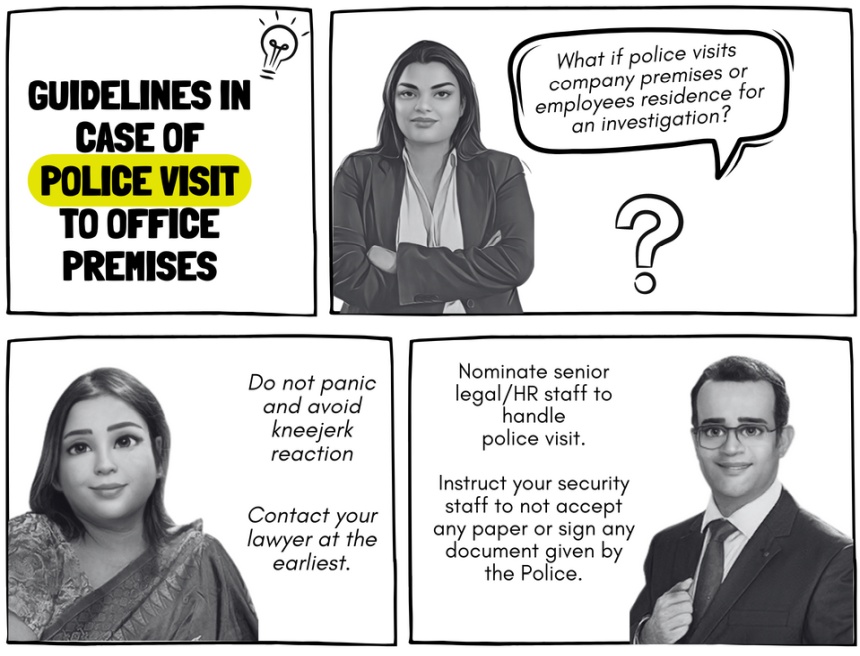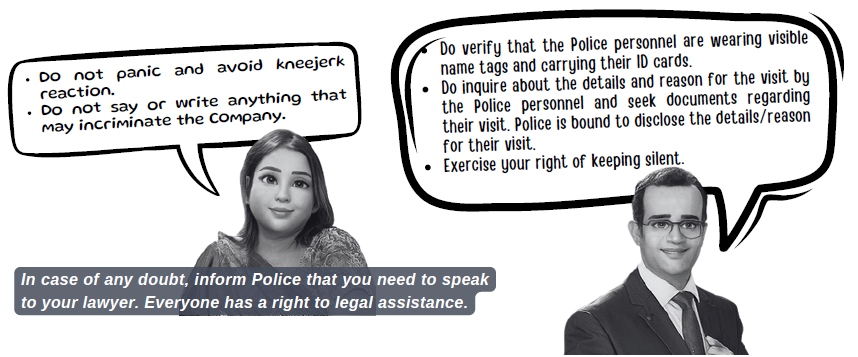- within Corporate/Commercial Law topic(s)
- in United States
- within Corporate/Commercial Law topic(s)
- in United States
- with readers working within the Media & Information industries
- within Litigation, Mediation & Arbitration, Food, Drugs, Healthcare, Life Sciences, Government and Public Sector topic(s)

In the recent times, there has been a growing trend of lodging frivolous FIR's in otherwise purely commercial disputes with an intent to harass and intimidate the opposite party i.e., the company (Company), its directors and/or its key managerial personnel (KMPs). This malaise is further compounded where the Company has foreign nationals as directors, irrespective of the fact whether they are based in or out of India.
The Police at the behest of the complaining party tends to make an unannounced visit to the corporate office of the Company or the residence of the directors / KMPs for any of the following:
- To serve summons where the Company, its director, KMPs and/or any employee has been named in their professional capacity;
- To serve summons to a director, KMPs and/or any employee who has been named in their personal capacity;
- To investigate a criminal complaint where the Company, its director, KMPs and/or any employee has been named in their professional capacity;
- To conduct search at the office/residential premises of the concerned parties in an ongoing investigation; or
- To take the person named in the complaint as an accused into custody.
In case the complaint has been made to a police station in a city or state where the Company does not have an office, the Police from other states can also visit for the above-mentioned purposes, but for serial nos. 3-5, they have to be accompanied by a police officer from the local police station.
STANDARD PROTOCOLS TO BE FOLLOWED:
- A senior employee (preferably from the in-house legal or HR team) be nominated to deal with the visiting Police officer.
- Instruct your security staff not to accept any paper or sign any document given by the Police and notify the nominated officer.
- Employees be clearly instructed not to interact with Police and instead promptly contact the nominated officer.
- The nominated officer may reach out to the lawyer.
- In case the Police are visiting for a personal matter of an employee, ask the employee to directly deal with the Police. The Company should not involve itself and avoid taking services on behalf of the employees.
DO'S AND DONT'S IN CASE OF POLICE VISIT

SERVICE OF SUMMONS
- In case summons is being served in the name of the Company, a copy can be received and acknowledged by a designated person on behalf of the Company.
- In case summons is being served in the name of an employee or ex-employee, but on behalf of the Company, the summons may be accepted and acknowledgement be given by a designated person on behalf of the Company.
- In case summons is being served in the name of an employee in the personal capacity then such an employee should receive the summons personally and give an acknowledgement.
- In case summons is being served in the name of an ex-employee in his personal capacity, inform Police in writing that the person has left the employment of the Company and return the summons.
FOR ARRESTING AN ACCUSED
- Police can also visit the Company to arrest a person accused of any offence after the accused has been served with a notice of appearance. They will likely be carrying a warrant of arrest.
- Police can also arrest without a warrant when the offense committed is categorized as "cognizable" i.e., serious crimes such as murder, rape, robbery, etc., for which the police can arrest without a court order.
- A warrant of arrest should be in writing, signed by the Magistrate of the Court and should bear the seal of the Court. It should also contain the name of the accused, his address and indicate the offence with which he is charged.
- A woman cannot be arrested after sunset and before sunrise, other than in exceptional circumstances. Awoman can be arrested only by a female police officer (as far as possible). A woman cannot be interrogated without the presence of a female Police officer.
- In case of a bailable offence, one cannot be arrested.
- Do not sign any paper except giving acknowledgment of receipt of any document until confirmed by your lawyer.
- The accused himself cannot be compelled to produce any document or property which is likely to involve him in any criminal charge. Hence Police must get a warrant issued by a court of law.
The content of this article is intended to provide a general guide to the subject matter. Specialist advice should be sought about your specific circumstances.




